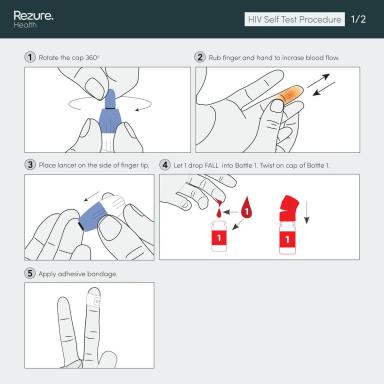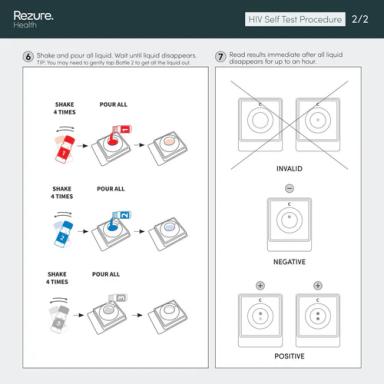HIV risk factors: Who should consider regular testing?
- Date:
- 06/06/2025
- Author:
- Ellie Jones

HIV isn’t always easy to talk about. For many people, it carries deeply personal questions about trust, past relationships, and future plans.
You could be starting something new with a partner and want to be open about your health. Maybe there's a moment from the past that still lingers in your mind. Or perhaps you just want the peace of mind that comes from knowing.
In this post, we talk about who might consider HIV testing, what factors can increase risk, and how discreet, at-home options make it easier to take control of your health, with privacy at the centre.
Why consider HIV testing?
Sometimes it’s not just about medical advice or statistics, but about a personal feeling. Many different reasons and emotions could prompt a decision to test for HIV.
You might be concerned about a recent experience with a sexual partner. It’s possible you’ve learned that someone you were with has tested positive, and now you’re unsure what that means for you. Perhaps you’re part of a group that’s statistically at higher risk, whether that involves frequent unprotected sex, drug use, or simply the challenges of navigating complex relationships.
However, it can just be about wanting to take care of your health, no matter what your history looks like.
Testing can be a helpful step and offers a way to check in with yourself, protect others, and move forward with confidence.
Understanding risk factors: who should test?

Even though anyone can benefit from knowing their HIV status, certain factors can mean you should consider testing more frequently. Discussing risk factors is for understanding potential ways HIV is transmitted and then helping you decide what is best to do next.
Different life experiences and situations can influence whether it makes sense to get tested. To help you better understand who might benefit from testing, here are some common questions and answers.
Whether you see yourself in one of these or just want to learn more, this could offer some clarity and guidance on when and for whom testing is recommended:
Should I get tested regularly for HIV if I have multiple sexual partners?
Yes. It’s always a good idea to consider regular testing, especially if you don’t always use protection, have frequent sexual partners, or if your partners’ HIV status is unknown.
Is HIV testing important for men who have sex with men (MSM)?
Yes. Many health experts recommend regular testing for MSM, as this group statistically faces a higher risk, however, your healthcare provider can help guide you on what feels like the best option.
Should I get tested for HIV after having unprotected sex?
Yes. Unprotected sex can always increase your risk of any STI, so testing is always a best practice to maintain.
I was recently diagnosed with an STI. Should I get tested for HIV too?
Yes, this is recommended. Since having an STI can make HIV transmission easier, getting tested can be advisable for your peace of mind.
My partner is living with HIV. What should I do?
Regular testing can help alleviate any concerns related to sexual health, especially when a partner is living with HIV. It’s important to discuss any concerns with your healthcare provider about prevention options that can protect you.
I inject drugs or share needles. Is HIV testing important for me?
Absolutely. Sharing needles can be a high-risk behavior for transmitting HIV, so testing regularly is key to catching any infection early.
I have been incarcerated. Should I consider HIV testing?
Yes. The environment and circumstances associated with incarceration can increase your risk, which makes testing a valuable precaution.
If any of these situations resonate with you, looking into testing options is a positive step.
The convenience and reliability of at-home testing
The thought of getting an HIV test can often feel daunting and could bring up feelings of worry or anxiety. By having the option of an at-home test, this can help alleviate the potential stress of visiting a clinic or lab-based setting, and adds a valuable sense of privacy and discretion.
At Rezure, we think taking charge of your health should feel empowering, not overwhelming. Our range of tests, such as the Home HIV 1 and 2 Rapid Test Kit, is designed with your comfort and peace of mind at the forefront. We want to remove the stress and make it as easy as possible for you to get the answers you need, discreetly and without judgment.
We've made our kits very simple to use, with instructions that guide you through every step and are CE-certified, ensuring the process is straightforward, stress-free, and reliable.
No matter the result, remember these tests aren't intended to give you a definitive diagnosis. Instead, they offer an important starting point for a conversation with your healthcare provider, giving you an indication that might guide further steps.
How to Use an HIV Self-Test Kit


HIV self-test kits are designed to be simple, safe, and easy to use at home. While different brands may vary slightly, most follow a similar process. Here’s a quick step-by-step guide to help you understand how it usually works.
Start by washing your hands and placing the test device on a flat surface. Use the lancet to prick your finger, then let a drop of blood fall into the first bottle. Shake it four times and pour it into the centre of the test device. Repeat the same process with Bottles 2 and 3, shaking each one before use.
Once all the liquid has been absorbed, read your result immediately:
- One dot under “C” = likely negative
- Two dots = possible positive (see a doctor to confirm)
- No dots or unclear result = test is invalid; use a new kit
Taking the next step
Choosing to take an HIV test is a positive action. It's about taking control of your health journey and empowering yourself with knowledge. Whether you fall into an at-risk group where testing is particularly recommended or simply want the reassurance of knowing your status, getting tested is a step towards greater well-being.
If you receive a positive result from a rapid test, it's important to remember this indicates a potential exposure and requires follow-up confirmation from a healthcare professional. They can provide support and guide you through any necessary next steps.
If your result is negative, it offers valuable peace of mind, but it's still important to consider future testing frequency based on your circumstances.
Empowering yourself with knowledge

Knowing your HIV status is an important part of caring for your well-being. It’s not just a medical step, it can bring self-awareness, clarity, peace of mind, and a sense of empowerment. Taking this step can help you make informed choices for yourself and for those you care about.
With reliable, accessible, and discreet self-testing, getting an at-home HIV test can ease some of the stress that often comes with traditional sexual health clinics. These tests offer a private, flexible option to check in on your health in your own space and time.
However, it's important to know that at-home HIV tests are not a replacement for clinical testing. A positive result should always be followed up with confirmatory testing through a healthcare provider. Even a negative result can be a valuable starting point for a conversation with a professional about prevention, follow-up testing, or other aspects of your sexual health.
Self-testing can be the first step in a larger journey for ensuring your comfort, privacy, and long-term well-being.


